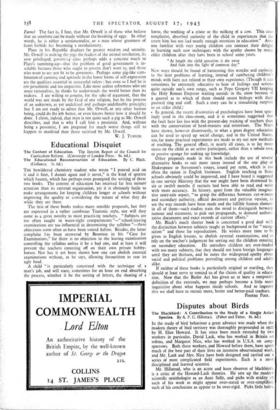Educational Disquiet
THE bewildered chemistry student who wrote " I poured acid on it and it fizat, I dunnit again and it never," is the kind of spectre which haunts, which has perhaps even prompted the writing of these two books. The content of education has received far less minute attention than its external organisation, yet it is obviously futile to make arrangements for keeping children longer m schools without improving the quality or considering the nature of what they do while they are there.
The first of these books makes many sensible proposals, but they are expressed in a rather cumbrous Teutonic style, nor will they come as a great novelty to most practising teachers. " Subjects are too often taught in water-tight compartments "—" school-leaving examinations are too influential in determining the syllabus "—these objections seem often to have been voiced before. Besides, the latter complaint has been answered by Brereton in his "Case for Examinations," for there is no objection to the leaving examination controlling the syllabus unless it be a bad one, and at least it will prevent the teachers cantering off on their own private hobby- horses. Nor has it yet been shown how one can abolish external examinations without, as he says, allowing favouritism to rear its ugly head.
A child " is particularly concerned with. the technique of a man's job, and will stare, sometimes for an hour on end absorbing the process, whether it be the sorting of letters, the shoeing of a horse, the working of a crane or the milking of a cow. This co..- templative, absorbed curiosity of the child in experiences that in- terest him has not had nearly enough attention in education." An . one familiar with very young children can contrast their delig in learning such new techniques with the apathy shown by ma: • older children after they have been in school some years.
" At length the child perceives it die away
And fade into the light of common day."
New ways should be found of harnessing this wonder and curio:ts to the later problems of learning, instead of cumbering children's minds with facts not related to their own experience. (Though it can sometimes be extremely educative to hear of feelings and actions quite outside one's own range, such as Pope Gregory VII keeping the Holy Roman Emperor waiting outside in the snow because of a quarrel as to which of them should invest bishops with their pastoral ring and staff. Such a story can be a stimulating surprise to an order child.)
In general, the recent discoveries of psychologists have been spar- ingly used in the class-room, and it is sometimes suggested that the fault here lies less with the present-day training of teachers than with the conservatism of head-masters and mistresses. The Nazis have shown, however disastrously, to what .a great degree education can be used to speed up social change, and in the United States, too, far more practical experiments are made to try out new methods of teaching. The general effect, in nearly all cases, is to lay more stress on the child as an active participant, rather than a tabula rasa, or passive sponge for soaking up knowledge.
Other proposals made in this book include the use of several alternative books to suit more tastes instead of the one play of Shakespeare or Stevenson's essays, issued per term, which is too often the ration in English literature. English teaching in State schools obviously could be improved, and I have heard it suggested in one service Ministry that the war might have been shortened by six or twelve months if recruits had been able to read and write with more accuracy. In history, apart from the valuable imagina- tive story-tale aspect, " to grasp the difference between eye-witness and secondary authority, official document and partisan version, to see the way records have been made and the fallible human element in all of them—such studies train the mind to distinguish between rumour and statement, to pick out propaganda, to demand authori- tative documents and exact records of current affairs."
Mr. Black's much shorter book is concerned a good deal with the distinction between subjects taught as background or for " recog- nition " and those for reproduction. He wishes more time to be given to English lessons, to abolish external examinations, and to rely on the teacher's judgement for sorting out the children entering on secondary education. He considers children are over-loaded with too many subjects, that they should not learn foreign languages until they are thirteen, and he notes the widespread apathy about social and political problems prevailing among children and adults alike.
If neither of these books is particularly original or startling, they should at least serve to remind us of the claims of quality in educa- tion. Now that the Butler Act has given us at least a temporary definition of the externals, we may perhaps become a little more inquisitive about what happens inside 'schools. And to improve this we shall have to recruit more, better and better-paid teachers.
PHOEBE POOL.


























 Previous page
Previous page